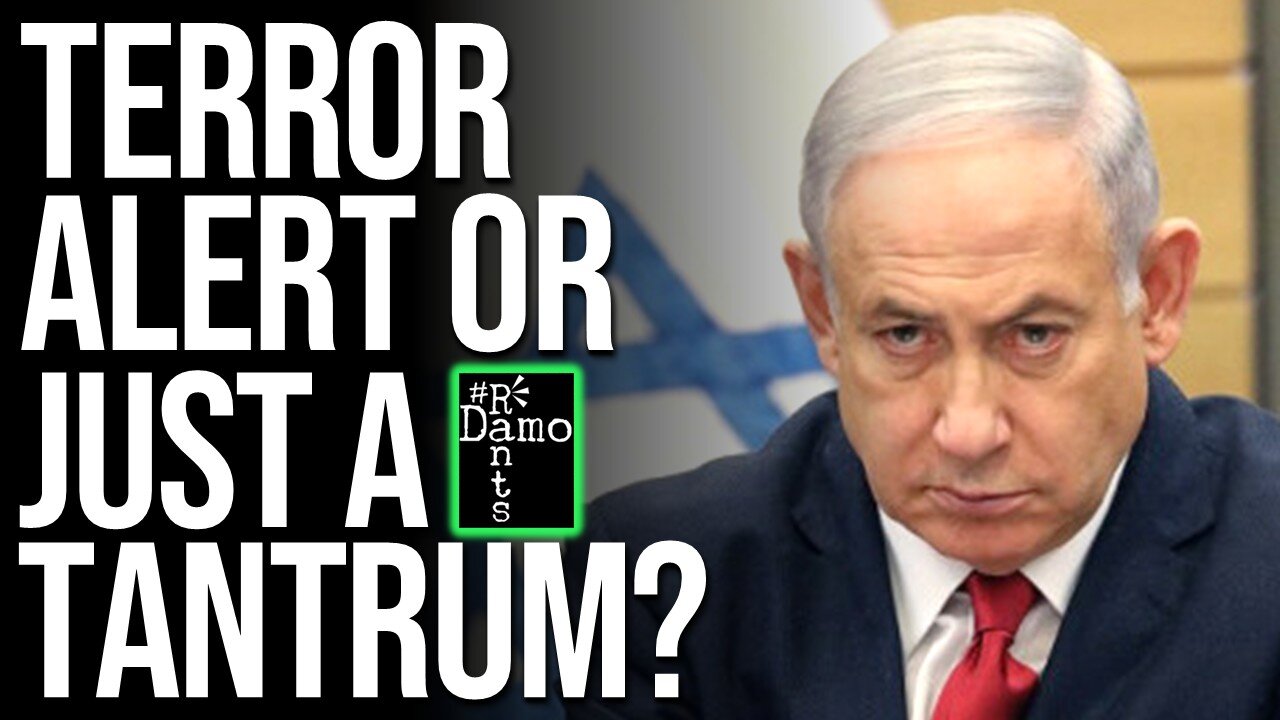Premium Only Content

Israel's Security Clash With the UAE - Terror Threat or Tantrum?
Right, so what happens when a country credibly accused of genocide warns its own citizens that their lives are at risk in the glitziest, most tightly surveilled police state in the Arab world — and that country’s supposed ally says nothing? Well this month, Israel abruptly escalated its travel advisory for the United Arab Emirates (UAE), warning citizens against non-essential travel there and citing “heightened threats” from apparent terror groups. Simultaneously, it quietly evacuated most of its diplomatic staff — an extraordinary gesture that implied, without stating, that the UAE could no longer be trusted to guarantee the safety of Israeli personnel.
Curiously, the UAE government have said nothing despite this significant diplomatic slight. No denial. No clarification. No protest. For a state that spends billions annually polishing its image as a fortress of stability and modernity, the silence is deafening. What might have sounded like an intelligence-led act of caution from Tel Aviv increasingly resembles, under closer scrutiny, an opportunistic act of diplomatic theatre. One that served not only to reassert Israel's narrative dominance in the region that they are under threat and they are victims, but to distract from a quieter scandal unfolding beneath the surface.
Right, so Israel warning its citizens to stay away from possibly the most Israel friendly and certainly most surveilled police state in the Arab world, the United Arab Emirates and the UAE saying nothing about it, so much for 5 years of normalised ties then it would seem.
To understand the implications of Israel’s advisory here, lets start with the official justification that they have provided. According to the Israeli Prime Minister’s Office and National Security Council (NSC), the alert was issued due to credible intelligence of increased activity by terror groups, with some Israeli sources stating that these are aligned with Iran, because of course they would be wouldn’t they? In a statement issued on 31 July, the NSC warned Israelis to avoid non-essential travel to the UAE, citing heightened motivation from said groups to target Israeli nationals. The Jerusalem Post reported that Israel had decided to evacuate its diplomatic personnel after receiving unspecified intelligence pointing to a credible risk, yet were also keeping the embassies open, so ordinary staff must remain otherwise who’s going to open up? The NSC narrative was rapidly disseminated by Israeli media and amplified by security analysts, who framed it within the broader context of escalating regional threats from the likes of Hezbollah, Hamas, and any other Iran-linked actors they could shoe-horn in.
On the surface, this was plausible. Israel has real enemies in the region, I’d suggest they’re very good at making them. But critical scrutiny reveals several inconsistencies. No specific threat details were released to the public. No allied intelligence agency, including the United States or the United Kingdom, issued corroborating warnings. The Emirati government offered no confirmation at all, nor even the standard diplomatic platitude about "ongoing cooperation against shared threats" that kind of thing. The absence of even a token response from the UAE, a country that typically over-engineers its image as a regional safe haven, was striking. If the threat were real, you would expect the Emirates to loudly defend its security credentials wouldn’t you? If you’d been accused of such, you’d push back as well wouldn’t you? That it remained silent suggests something else was at play.
That "something else" quickly came into focus with reports concerning Yossi Shelley, Israel’s ambassador to the UAE. Shelley, a longtime Netanyahu loyalist and former ambassador to Brazil, was reportedly involved in a bit of a scandal at an Abu Dhabi bar. While details remain scarce, multiple sources allege that his behaviour was inappropriate, including towards women and Emirati security staff. More’s the pity it wasn’t because he was part of a genocidal apartheid regime, but there we go. This was not a minor diplomatic fall out though. According to Ynet amongst other outlets, Emirati officials were incensed enough to demand his removal through private diplomatic channels. In response, the Israeli Foreign Ministry arranged for Shelley’s quiet exit. But rather than publicly acknowledge the incident, the government allowed the security narrative to absorb it. Shelley was simply part of a wider withdrawal prompted by external threats.
The timing was suspiciously convenient. It provided the Netanyahu government an exit strategy that saved face. It also avoided accountability for appointing a political loyalist whose conduct embarrassed Israel abroad. In doing so, it reinforced a recurring pattern: Israel dresses up domestic or diplomatic failure in the language of existential threat. This tactic has been seen before. In moments of internal scandal or reputational crisis, Israel often defaults to the security playbook — a powerful rhetorical shield in the global imagination.
Israel’s record of manipulating intelligence narratives is well established. Consider its January 2024 campaign against UNRWA, in which it claimed that 190 employees of the UN refugee agency in Gaza had direct ties to Hamas. The claim, which emerged just as the ICJ genocide hearings commenced, triggered immediate suspensions of funding from key Western donors. Yet months later, a UN-commissioned review led by Catherine Colonna concluded that Israel had provided no credible or verifiable evidence whatsoever. The accusations collapsed under scrutiny, but the damage to UNRWA and Palestinian civilian infrastructure had already been done.
The pattern repeats. From the widely publicised but unverified claim that Hamas fighters beheaded babies on October 7, to the shifting lies about the killing of journalist Shireen Abu Akleh, Israel has repeatedly deployed unsubstantiated claims to serve immediate political goals. These narratives are not always believed, but they are reported. They dominate news cycles. They shift attention. And crucially, they insulate Israel from accountability, even as its actions escalated from collective punishment to ticking every box of what constitutes genocide under the Genocide Convention.
Even the claim that Iran is always just "weeks away" from a nuclear weapon — a narrative Israel has pushed for decades — has lost credibility in intelligence communities. Yet it continues to resurface precisely when Israel needs to justify military action or distract from diplomatic failures and we saw where that got them back in June. In each case, the narrative serves a political function first, and a security function second.
Within this context, the UAE travel warning appears less like a response to urgent intelligence and more like a familiar page in the playbook. It served multiple functions: it allowed Israel to frame its diplomatic withdrawal not as an admission of scandal, but as a brave and necessary act of self-protection; it reminded the UAE who sets the narrative in their partnership; and it reinforced the illusion of permanent Israeli vulnerability — a narrative essential to sustaining its militarised posture abroad.
But what of the UAE? Why have they said nothing? Why allow its security credentials to be publicly questioned? Why absorb an Israeli narrative that implies the Emirates cannot protect foreign diplomats? Their reputation has been impugned here? Why not defend yourselves?
The answer lies in the structural nature of the UAE-Israel relationship. Despite the rhetoric of equal partnership under the Abraham Accords, the reality is an asymmetric alliance in which Israel exercises narrative dominance and the UAE plays the role of silent enabler. The Emirati leadership, ever conscious of its proximity to US military protection and its own ambitions as a tech and intelligence hub, has decided that silence is safer than sovereignty. Authoritarian states do not fear embarrassment in the way democracies do. They can endure humiliation so long as their strategic goals remain intact.
Moreover, the UAE likely saw little gain in publicly challenging the Israeli narrative. To do so would be to draw greater attention to the Shelley scandal, which the UAE also had little interest in broadcasting. It would also risk appearing to side with Iran or Hamas at a time when the Gulf state is still trying to walk the tightrope of regional diplomacy. And perhaps most importantly, it would disrupt the illusion of alignment that the Abraham Accords were designed to project.
Yet this silence still has consequences. By refusing to rebut Israel’s claims, the UAE appears complicit in a false narrative. It sends the message that it is more concerned with maintaining access to Israeli and American weaponry than with defending its own credibility. It surrenders the high ground not just to Israel, but to regional rivals like Qatar and Algeria, who have positioned themselves as more principled in their opposition to Israeli aggression, so far as they go with it.
The UAE’s refusal to respond also undermines the supposed legitimacy of the Abraham Accords. What kind of partnership allows one state to accuse the other of being unsafe without evidence? What kind of alliance is so brittle that it must hide diplomatic scandals behind terror alerts? If normalisation is to mean anything, it surely must include mutual respect. What we see instead is a relationship in which Israel reaps the benefits while the UAE bears the costs.
This episode is not just about one travel warning. It is about how power is exercised through narrative. It is about how Israel, even under credible accusations of genocide, continues to manipulate the discourse. It is about how the UAE, desperate for strategic clout, allows itself to be used as cover for Israeli misbehaviour. And it is about the dangerous normalisation of propaganda as statecraft, where truth becomes secondary to image, and allies become props.
When Israel evacuated its diplomats from the UAE, it was not just removing staff. It was removing accountability. It was transforming scandal into strategy. And the UAE, far from protesting, held the door open for them.
In the long run, this kind of relationship is unsustainable. The more Israel relies on deception to cover its failings, the more credibility it loses, as if its not losing it fast enough already. The more the UAE allows itself to be used, the more it looks like a client state rather than a sovereign actor and more fool them for it.
Frankly, the UAE could do with taking a leaf out of Belgium’s book – because they’re standing for none of Israel nonsense and even when people just turn up for a music festival, if they’ve been committing war crimes it will find them in Europe now too. Check out the details of that story in this video recommendation here as your suggested next watch.
Please do also hit like, share and subscribe if you haven’t done so already so as to ensure you don’t miss out on all new daily content as well as spreading the word and helping to support the channel at the same time which is very much appreciated, holding power to account for ordinary working class people and I will hopefully catch you on the next vid. Cheers folks.
-
 LIVE
LIVE
LFA TV
12 hours agoLIVE & BREAKING NEWS! | MONDAY 10/6/25
1,381 watching -
 UPCOMING
UPCOMING
Chad Prather
20 hours agoEven Now!! Is It Too Late For A Miracle?
1.6K1 -
 LIVE
LIVE
JULIE GREEN MINISTRIES
1 hour agoLIVE WITH JULIE
17,936 watching -
 LIVE
LIVE
The Bubba Army
2 days agoBad Bunny Disrespectful? - Bubba the Love Sponge® Show | 10/06/25
4,113 watching -
 LIVE
LIVE
BEK TV
2 days agoTrent Loos in the Morning - 10/06/2025
231 watching -
 1:21:55
1:21:55
Mike Rowe
4 days agoThis Is How We CHANGE Education Today | Meredith Olson #451 | The Way I Heard It
7.41K11 -
 1:18:46
1:18:46
Steve-O's Wild Ride! Podcast
3 days agoJacoby Shaddix Breaks Down Papa Roach Longevity | Wild Ride #269
1.39K2 -
 17:42
17:42
Nate The Lawyer
1 day ago $2.26 earnedHow A Criminal Illegal Alien Scammed His Way Into A $300k Government Job.
5.36K8 -
 28:46
28:46
DeVory Darkins
13 hours ago $14.38 earnedPritzker HUMILIATED after brutal fact check as Democrat candidate calls for political assassination
16.1K88 -
 19:54
19:54
Forrest Galante
10 hours agoPrivate Tour Of America's Best Marine Animal Facility
28.2K7
